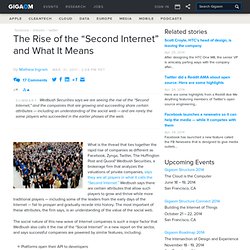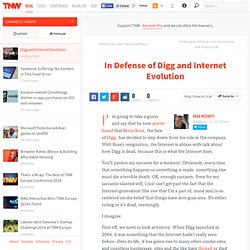

Marc Andreessen on Why Software Is Eating the World - WSJ.
The Rise of the “Second Internet” and What It Means: Tech News and Analysis « What is the thread that ties together the rapid rise of companies as different as Facebook, Zynga, Twitter, The Huffington Post and Quora?

Wedbush Securities, a brokerage firm that analyzes the valuations of private companies, says they are all players in what it calls the “Second Internet.” Wedbush says there are certain attributes that allow such players to grow and thrive while more traditional players — including some of the leaders from the early days of the Internet — fail to prosper and gradually recede into history. The most important of these attributes, the firm says, is an understanding of the value of the social web. The social nature of this new wave of Internet companies is such a major factor that Wedbush also calls it the rise of the “Social Internet” in a new report on the sector, and says successful companies are powered by similar features, including: There are some caveats worth keeping in mind when reading the report, of course.
It's Official(ish): MySpace Is Biggest Site on Internet. The November Comscore numbers show the inevitable: Fox Interactive (mostly MySpace) now has more page views than the combined Yahoo sites, taking the no. 1 spot for the first time.

This was less to do with MySpace growth than with a 9% dip in overall Yahoo traffic (total Internet traffic for all sites in November dipped just 3%; Google was up 5%). Yahoo still dominates in total unique vistors, though, with over twice as many people visiting Yahoo sites as MySpace. The end game isn’t page views, its user attention and, ultimately, revenue. Still, MySpace has every reason to pop the champagne today and celebrate their 200% growth in page views over the last twelve months. One or two quick acquisitions, of course, would put Yahoo right back in the no. 1 spot. In Defense of Digg and Internet Evolution. I’m going to take a guess and say that by now you’ve heard that Kevin Rose, the face of Digg, has decided to step down from his role in the company.

With Rose’s resignation, the Internet is ablaze with talk about how Digg is dead, because this is what the Internet does. You’ll pardon my sarcasm for a moment. Obviously, every time that something happens or something is made, something else must die a terrible death. OK, enough sarcasm. Even for my sarcastic-slanted self, I just can’t get past the fact that the Internet generation (the one that I’m a part of, mind you) is so centered on the belief that things have zero gray area. I disagree. First off, we need to look at history. Is Digg changing? A few short years ago, people at Yahoo laughed at a scrappy search startup called Google. When broadband Internet started taking hold in the United States, AOL was finding itself in a very dangerous situation. Why have Yahoo and AOL managed to live?